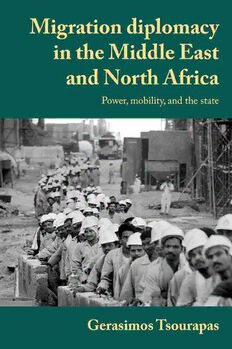
Migration diplomacy in the Middle East and North Africa: Power, mobility, and the state PDF
Preview Migration diplomacy in the Middle East and North Africa: Power, mobility, and the state
Migration diplomacy in the Middle East and North Africa Migration diplomacy in the Middle East and North Africa Power, mobility, and the state Gerasimos Tsourapas Manchester University Press Copyright © Gerasimos Tsourapas 2021 The right of Gerasimos Tsourapas to be identified as the author of this work has been asserted by them in accordance with the Copyright, Designs and Patents Act 1988. Published by Manchester University Press Altrincham Street, Manchester M1 7JA www.manchesteruniversitypress.co.uk British Library Cataloguing-in-Publication Data A catalogue record for this book is available from the British Library ISBN 978 1 5261 3209 3 hardback First published 2021 The publisher has no responsibility for the persistence or accuracy of URLs for any external or third-party internet websites referred to in this book, and does not guarantee that any content on such websites is, or will remain, accurate or appropriate. Cover image: © Abbas/Magnum Photos Cover design: Abbey Akanbi, Manchester University Press Typeset by New Best-set Typesetters Ltd ‘Thus the inhabitants of a more populous city are more prosperous than their counterparts in a less populous one: the judge in the former being better off than the judge in the latter; the trader, than the trader; the craftsman, than the craftsman; the man in the street, than the man in the street; the prince, than the prince; and the policeman, than the policeman.’ Ibn Khaldun, Muqaddimah (1377) Contents List of figures and tables page viii Preface ix Acknowledgements x Introduction 1 1 Analysing mobility in the Middle East from the perspective of migration diplomacy 16 2 Migration and the state in the modern Middle East: a history 39 3 Constructing the migrant as a subject of power in Egypt 49 4 State–diaspora relations and regime security in North Africa 66 5 Inter-state cooperation and labour migration to the Gulf 94 6 Managing mobility as a host-state issue-linkage strategy 113 Conclusion 147 References 153 Index 175 Figures and tables Figures 4.1 Uncle Sam saluting the Egyptian peasant page 79 Tables 2.1 Phases of Middle East migration page 46 4.1 Immigrants admitted to the US from Middle Eastern countries, 1953–73 80 4.2 Intentions of highly-skilled migrants at time of US entry and 1970 (%) 85 4.3 Titles of Friends of Egypt conferences 91 5.1 Saudi Arabian work permits and remittances to Jordan 99 5.2 Worker remittances as a share of Jordanian GNP (%) 110 5.3 Estimates of Jordanian migrant stock (2013–15) 111 6.1 Sectoral distribution of foreign labour in Libya, 1970–90 126 Preface The rise of varied forms of cross-border mobility into, out of, and across the Middle East and North Africa has generated both tensions and opportuni- ties for states within the region. Not surprisingly, Arab and non-Arab states alike have developed complex policies that engage with labour emigration and immigration, forced displacement, as well as diasporic mobilisation. One dimension of the politics of migrants, refugees, and diasporas in the Middle East that has received less academic attention concerns the interplay between states’ migration and foreign policymaking. How does cross-border mobility feature in Middle East states’ diplomatic strategies? This book aims to enhance existing scholarly work, which has yet to engage in a sustained manner with the international politics of migration in the Global South, by exploring four dimensions of migration diplomacy in the con- temporary Middle East. It examines how emigration-related processes become embedded in governmental practices of establishing and maintaining power; how states engage with migrant and diasporic communities residing in the West; how oil-rich Arab monarchies have extended their support for a number of sending-states’ ruling regimes via cooperation on labour migration; and, finally, how labour and forced migrants may serve as instruments of political leverage. Drawing on multi-sited fieldwork and data collection and employing a range of case studies across the Middle East and North Africa, the book adds to existing understandings of regional migration governance in the Global South. It identifies how the management of cross-border mobility in the Middle East is not primarily driven by legal, moral, or human rights considerations but dictated by state actors’ key concern – political power.
